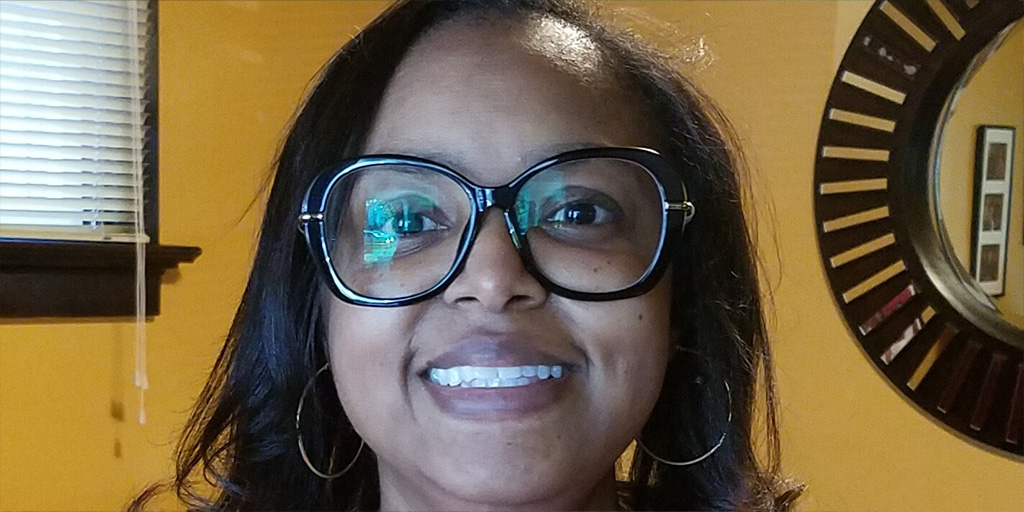
People May Not Accept Your Disability. You Don’t Have to Accept That.
By Tomeca Goodwin | Wednesday, September 30, 2020
Tomeca Goodwin, 46, lives with a form of limb-girdle muscular dystrophy (LGMD). Born in Cincinnati, where she still resides, Tomeca has had a long career in community health. She also owns and creates sweet confections through Unique Candy Cakes by Mec. She loves a good gut-busting, tear-dropping laugh (even at herself), and enjoys reading, spending time with friends and family, learning new things, traveling, and shopping. She’s known for her collection of unique glasses, which she wears proudly.
How we treat people is a true measure of our character. As children, most of us are taught not to point, stare, or mistreat others because they are different. However, if we are honest, we do not always behave this way. As I have grown, I do not see things the way I did as a child. Being a Black woman diagnosed with LGMD and several other conditions in the last 25 years caused a huge shift in my life, and I continue to adjust day to day. This consistent shift has opened my eyes to things that I may not have seen or experienced otherwise.
I try not to think too much about the unfortunate situations, encounters, or people who have treated me badly because they were not blessed with a disability such as mine. But I’m still surprised by the lack of integrity, respect, and compassion others can have.
In the past few years, people have shouted at me, “You’re not handicapped!” While at work, I had a derogatory note put on my car for parking in an accessible parking space. I cannot count the number of times people have checked to see if I had a handicapped placard in my car. I was once told that an accessible fitting room was reserved for people with disabilities and moms with strollers. A co-worker once teased me by making the comment, “I see you with your gangster walk,” and another mocked my walk by acting like one of those sky-dancer inflatables at a car dealership.
Discrimination is real and does not just apply to race or religion.
I have worked for the same employer for more than 28 years, and for 20 of those years, I worked in the same department. I have had multiple managers over the years, but the last manager I had before leaving that department left an impression on me as to how not to treat people. This manager made me feel like she did not want to work with people who needed accommodations or had Family Medical Leave of Absence on file. While I was out of the office, she resituated the placement of my desk. I had used the wall behind my desk to stabilize my rolling chair when getting up, but in the new arrangement, I couldn’t do that. After several years of working together, small microaggressions like that one built up. I applied for other positions within the organization and after three years, got one.
I knew the new role, working in an outreach program to bridge gaps in healthcare for moms, was going to come with physical challenges because it required me to make home visits. I was still eager to dive into building relationships, advocating and assisting clients during their pregnancies and post pregnancies, but I soon faced discrimination among my peers.
The team I was assigned to consisted of six women of various ethnicities. You might not guess two Black women would make me, another Black woman, a target. One was a co-worker assigned to train me and the other, a nurse who assisted on the clinical side of serving our clients. I was given the OK to meet my clients where I could, even if it was in my car, which I often did because I am unable to climb stairs. The co-worker assigned to train me thought I should not have been hired for the job. She expressed that opinion in a group text and told me that I “needed to figure it out.” She discontinued training me and talking to me, and began her mission to either get me fired or make me quit.
My co-workers started treating me as if I did not exist, even when I was in the room. I was left in a dark office after having gone to the restroom, and left off group lunch orders. One co-worker would allow heavy doors to close in my face, knowing I was right behind. The nurse started sending my manager emails expressing her thoughts on my ability to perform my duties and began to give me tasks that were unnecessary and physically challenging.
I documented conversations and incidents by emailing myself, which was an awful experience, but necessary. I eventually went to the department manager and asked if there was another job I could do because by that time, another nurse case manager was being disrespectful to me, mocking me, and asking inappropriate questions about my disability. She asked me if I lived alone, if I used a reacher, if I used a walker or cane, and questioned my ability to perform the duties of the next position I was offered in birth records.
But she was wrong. My new role and I are suited for each other. I’m in an office with an adjustable desk, I have become a notary, and I do not have to leave my office.
Disabilities are not always visible. And unlike people, they do not discriminate. Just because you do not have what someone else has does not mean you will always have what you have now. For those living with a disability, keep pushing forward, be bold, and live in your uniqueness no matter what or who comes up against you. Know that there is a purpose and plan for your life. Giving up or giving in is not an option.
Disclaimer: No content on this site should ever be used as a substitute for direct medical advice from your doctor or other qualified clinician.




